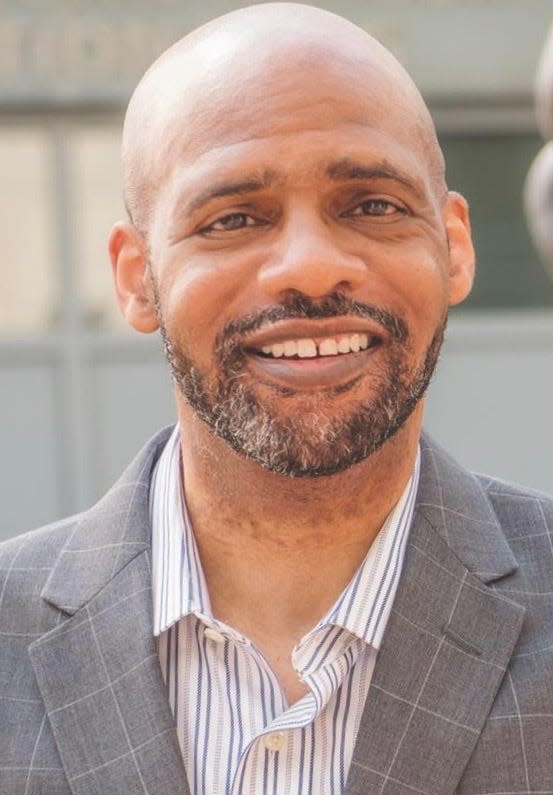With 910 AM news talk gone, who will pick up mantle of Black radio in Detroit? | Opinion
No matter how you look at the closing of WFDF-AM (Detroit's 910 AM Superstation), it’s a major loss for Black media.
(Yes, I certainly realize the station was owned by Kevin Adell, who is white, but it still was the only radio station where people in the largest Black populated city in America could get some community news.)
That should have set off our alarm bells off years ago, but I digress.
Still, its closing signals the end of an era — and sets a challenge for someone else to fill the gap, whether through traditional radio, or a podcast network.
Kevin Adell notified 910's unpaid radio hosts at 8 p.m. Friday night in an email that he’s changing the station’s format, and hosts were “no longer allowed on the premises.”
More: Detroit's 910 AM Superstation abruptly changes formats, lets hosts go via email
Adell’s spokesman, Mort Meisner, said the station has moved permanently to an all-sports format, adding that there will be at least "one local hire."
The changing media landscape nationally is causing newsrooms to shrink yearly. That, as a byproduct, has made Black news diminish, which increases the need for community issues and programs to be highlighted.
“All my life — and I'm in my 70s — well, I grew up on Black radio,” says Dr. Carl Taylor, a retired sociology professor whose focus has been Detroit. “Black radio played a critical part of my young life before the riot, and it's played an important role after the riot. It’s a cornerstone. When you have someone outside, they make decisions that benefit them personally and politically.”
We all should be beyond sad, but mostly upset Detroit is in the place it’s in now.

"With the sudden sort of closure, it should be something that we’re not surprised at all," says political analyst Greg Bowens. "For those of us who have followed media, 910 was particularly known for its sort of impolite way of making changes, whether that's in the lineup or the format. But what's also interesting is that we've gotten so used to losing Black-owned stations (or) Black programming that we don't see a lot of pushback from it. There’s been no protests."
In recent years, Adell has had his share of controversy — over a derogatory meme that depicted him dressed like a pimp, as well as his business practices of not paying local hosts and hires (he required hosts to sell ads or find sponsors to fund their spots).
And while Adell tapped some qualified Black journalists to host shows, they never seemed to last. Instead, Adell primarily selected hosts in hopes that their past controversies would attract listeners, like former City Council President Monica Conyers, former state Rep. Jewell Jones, former Mayor Kwame Kilpatrick's chief of staff Christine Beatty and Warren Mayor Jim Fouts.
That format never worked.
Where we got our news
Whether it is WOL (1450 AM) in Washington D.C., WURD (900 AM) in Philadelphia, WVON (1690 AM) in Chicago or in a smaller market such as WDIA (1070) in Memphis, Black talk radio has been the cornerstone of African American issues for decades.
For Black folks, it’s where we got our news. The on-the-ground accounts of Dr. Martin Luther King Jr.’s shooting, and the aftermath of riots in those cities, were covered by those stations by Black journalists who were not — by and large — in mainstream media yet.
Peety Greene, who was credited with quashing the King riots in D.C., is a Black radio icon, like Cliff Kelley, a former Chicago alderman who spent 25 years on the air, and was known there as “the Mayor of Talk Radio.”

Here, icons such as Martha Jean “The Queen” Steinberg, who broadcast for 48 hours straight during the 1967 riots, brought WCHB to Detroit. Detroiters held JoAnn Watson, whose early morning show told listeners up to “Wake Up Detroit” on WGPR, or John Arnold, on WCHB for a decade, in the same regard.
Taylor recalls being a MSU student recruiter in 1968 when Steinberg, and program director Norman Harris, allowed him to come on that show as a Spartan Ambassador. He was only 18.
“We literally had hundreds of students ... from Detroit Public Schools and the surrounding areas that were able to come to MSU because of how the Black radio touched the community,” Taylor says. “We need that connection. Maybe we won't have it (any) more, but that doesn't reduce the fact that we need it. It played a vital role.”
The loss of that voice, that perspective, that can only be given by the community has been lost. We must not lose sight of that.
More: Feds say media mogul Kevin Adell owes taxes on his father's estate, demand sale of mansion
That does not diminish the role of Black hosts like Mildred Gaddis or Stephen Henderson who are on the radio now, nor does it absolve other media from covering Detroit’s neighborhoods and people in a substantive way. It only puts more pressure on our media to do our jobs better — or for a new radio format to emerge.
Black talk radio stations were the only outlets where we could get authentic Black news — authentic, unfiltered news from Black community and from the Black mindset.
Detroit, of all places, should not be one of the major urban cities without a Black talk radio station.
We deserve good radio
On Sunday, I attended the The Soul of Philanthropy Community Champions luncheon at the Considine Little Rock Family Life Center.
About 20 community individuals and groups received awards for their work in Detroit in a multitude of areas, including homelessness, child care, education, the transformation of vacant lots into community gardens, teaching fathers better ways to raise their children, and a block club that started 15 years ago because of the lack of streetlights.
Each guest could tell Detroiters what they are doing to make this city better.
These are the stories we’re missing out on.
We all hear of the calamity that’s going on in this city, along with the dysfunction in our institutions. What’s too often missing is the balance of news that’s going on in Detroit.
That’s what’s now missing without a Black talk station in Detroit.
We’ve been suffering for almost a decade without hearing late legendary journalist Rev. Angelo Henderson’s intro of Jeezy singing, “I put on for my city" and going right into the crime report, saying, “heard shots, felt pain.”
Detroiters are still longing to hear substantial interviews on city issues from longtime award-winning journalist Cliff Russell, who died in 2018.
Black talk radio embodies the culture of not only high level news, but community news. People looked to Cliff Russell and Angelo Henderson for news, but they were well-known figures, approachable figures, in the community as well.
It’s what Detroiters need, then and now now. It’s what we all collectively deserve — good radio.
The answer: Blacks must continue to own our own institutions to preserve our voice.
“The need still exists for Black programming to give the wider world a peek into Black political thought (and) Black life,” Bowens says. “There is still certainly a need to have that controlled by Black folks. We haven't seen that in a long time either.”
We know terrestrial radio is facing financial challenges nationally. That just forces us to rely on what Black folks have done historically: find another way.
If radio is no longer the option, podcasting is now more accessible than ever.
Our voices are vitally needed. We just need Black folks in Detroit who are willing to step up.
Darren A. Nichols is a contributing columnist at the Free Press. He can be reached at darren@dnick-media.com or his Twitter handle @dnick12. Contact the Free Press opinion page: letters@freepress.com.
This article originally appeared on Detroit Free Press: Detroit 910 AM radio format change leaves Black media void | Opinion

